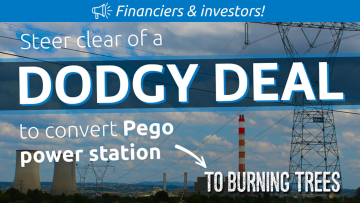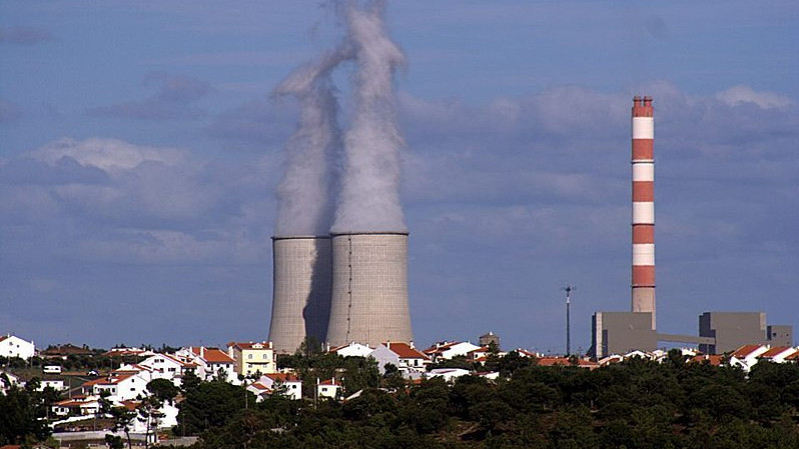
Project – On record
This profile is no longer actively maintained, with the information now possibly out of dateBiofuelwatch, Environmental Paper Network, Global Forest Coalition & ZERO
Oliver Munnion, Global Forest Coalition (GFC), oli@globalforestcoalition.org

Project – On record
This profile is no longer actively maintained, with the information now possibly out of dateBiofuelwatch, Environmental Paper Network, Global Forest Coalition & ZERO
Oliver Munnion, Global Forest Coalition (GFC), oli@globalforestcoalition.org
Why this profile?
TrustEnergy intends to convert Pego Power Station to burning wood pellets instead of decommissioning it and replacing it with genuinely low-carbon renewable energy. Burning woody biomass emits more CO2 per unit of energy generated than coal, and the demand for wood pellets is accelerating the destruction of wildfire-rich forests. In Portugal, wood pellet production for existing customers has led to pine woodlands being cut down at a much faster rate than they can regrow.
What must happen
Banks should avoid financing TrustEnergy’s project - either directly or via financing Marubeni and Engie - to burn wood pellets in Pego Power Station. Converting the plant to biomass would have a seriously negative climate impact, as well as causing harm to forests. Unless the biomass conversion project is abandoned, financiers and investors should make sure that any further finance given to this company can only be spent on TrustEnergy’s wind energy portfolio.
| Sectors | Biomass Electric Power Generation |
| Location |
|
| Status |
Cancelled
Design
Agreement
Construction
Operation
Closure
Decommission
|
Pego Power Station was Portugal’s last remaining coal power station. It is owned by TrustEnergy (56.25%) and Endesa (43.75%). With a capacity of 628 MW of electricity generation, it mostly burned coal imported from Colombia, a country where coal mining is associated with severe human rights abuses and with land and water grabbing. The plant finally stopped burning coal on November 20, 2021. However, instead of closing the power station for good, the power station’s majority shareholder, TrustEnergy, plans to convert it to burning wood pellets.
TrustEnergy is a 50:50 joint venture between the French multinational energy company Engie and the Japanese business conglomerate Marubeni. Endesa, the power station’s minority shareholder, opposes the biomass conversion plans and instead proposes to replace the power station with a large solar PV plant, coupled to battery storage and green hydrogen production.
In February 2021, nine Portuguese and 58 international NGOs issued an open letter to the Portuguese government and the European Commission objecting to TrustEnergy’s biomass conversion plans.
Impact on human rights and communities
Due to its location (in a populated area, with several towns and villages within a couple of kilometers), the Pego Power station is likely to pose severe health impacts due to air pollution. Air emissions from wood power and/or heat plants have comparable impacts on human health as coal burning plants. Overall, wood burning for energy is one of the two leading causes of small particulate (PM2.5) emissions in Europe and likely elsewhere, alongside traffic.
Next to that, wood dust exposure of workers and residents is linked to allergic and non-allergic respiratory and nasal problems, allergic dermatitis and two types of cancer. It is a common concern reported around wood pellet plants and woodchip storage sites. In the UK, Drax Plc is facing criminal prosecution for failing to protect workers from harmful wood dust linked to its conversion from coal to wood pellets.
Impact on climate
At full capacity, the converted Pego Power Station would burn up to 2.6 million tonnes of wood pellets a year, equivalent to up to 5.2 million tonnes of green (i.e. freshly cut) wood. By comparison, existing biomass power and heat plants in Portugal burn an estimated 2.8 million tonnes of green wood, with a further 1.8 million tonnes of wood used for pellet production, most of which is exported.
In general, large-scale burning of biomass for energy harms the climate, people, forest and hinders the clean energy transition. This is explained in the Biomass Delusion Statement.
Impact on nature and environment
The two main species grown for commercial wood production in Portugal are eucalyptus and pine. Eucalyptus wood has a high chlorine content and is therefore not suitable for burning in a plant such as Pego Power Station. TrustEnergy claims that they will get around that problem by producing torrefied wood pellets on-site made from eucalyptus, which would be chemically more similar to coal. However, as an investigation by Biofuelwatch shows, no company in the world has been able to produce torrefied wood pellets at a commercial scale.
This means that TrustEnergy would need to burn pellets produced domestically from pine and/or imported wood pellets. In Portugal, pine is already being logged at a much faster rate than it can regrow, with the president of Portugal's wood and furniture industry association declaring that “Portugal’s forest management is ruinous”. Pellet imports would likely come from North America, with the largest pellet-exporting region being the south-eastern USA. There, wood for pellets is routinely sourced from the clearcutting of highly biodiverse coastal hardwood forests.
A list of investors and financiers of Marubeni can be found on Urgewald’s Global Coal Exit List. Below we list the top investors and financiers of Marubeni and the top shareholders of Engie. Information on the financiers of each company can also be found on the Marubeni and Engie company profiles.
The Pego power station is owned by TrustEnergy (56.25%) and Endesa (43.75%). TrustEnergy is a 50:50 joint venture between the French multinational energy company Engie and the Japanese business conglomerate Marubeni.
2022
2022-03-13 00:00:00 | Endesa wins tender proposal to build solar and wind energy project at Pego
The jury of the tender for the allocation of capacity to connect to the electricity grid that is currently occupied by the Pego coal-fired power station confirmed, in the review of its preliminary report, that the best bid presented in the auction belongs to Spain's Endesa. The winning proposal does not assume converting the coal plant, which closed at the end of 2021, to biomass.
